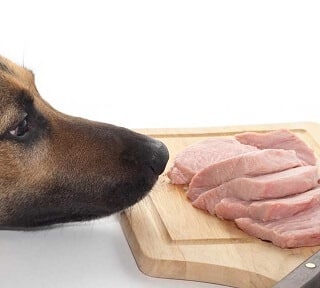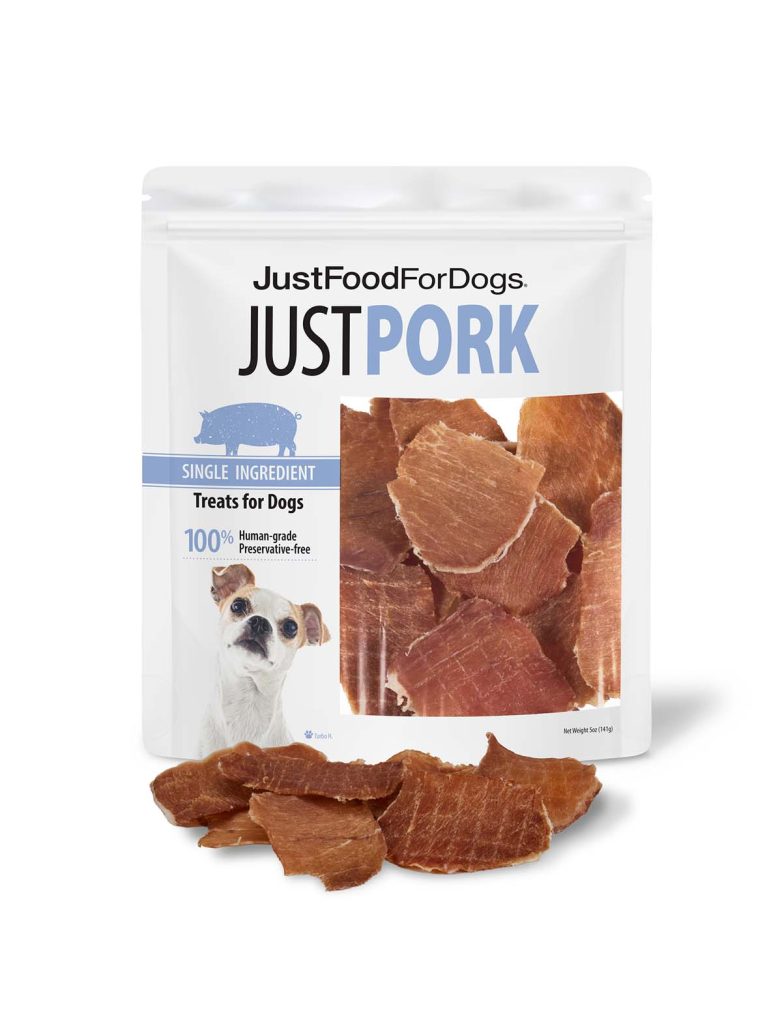Is pork OK for dogs? Yes, but it depends on the cut of meat. Heres everything pet parents need to know about giving their dog pork.
It’s not uncommon for loving pet parents to want to share human foods with their best friend. You might wonder if your dog can eat pork products if that’s something you like to do. You might wonder if pork is safe for dogs to eat. It is the other white meat and is said to be better for them than red meat.
Naturally, pork can be a good source of protein. Whether it’s okay for your dog to eat depends on the type of pork you give them and how it was cooked. Let us look at what you can share with your dog and when you need to be extra careful.
As dog owners, we know our furry friends love a good meaty treat. When prepping our own dinners, it’s natural to wonder – can I share a little of this cooked pork with my dog? The answer is yes, you can safely feed your dog cooked pork in moderation. However, there are some guidelines to follow for preparing pork for your pooch.
Cooked pork can make an enticing protein-rich snack or meal mixer for dogs. Lean unseasoned pork provides a highly digestible protein source. Yet pork does require proper handling and cooking to avoid risks. Here are some tips on safely incorporating cooked pork into your dog’s diet.
Is Cooked Pork Good for Dogs?
Plain cooked pork generally poses no issues for canine consumption and provides benefits including:
- High-quality protein for energy and muscle maintenance
- Important amino acids for cell repair and growth
- B vitamins including thiamine, niacin, vitamin B6 and B12
- Minerals like iron, zinc, potassium, phosphorus and selenium
- A novel protein source for dogs with food allergies
When included as the occasional treat or meal addition cooked pork can be a nutritious supplemental protein for dogs. Just be sure to choose healthy preparation methods.
How to Choose the Right Pork Cuts
Not all pork products are created equal when it comes to your dog. If you want to feed your dog cooked pork, here are some things you should be careful of:
Recommended Pork Cuts
- Lean cooked pork chops, boneless and fat-trimmed
- Shredded cooked pork shoulder or loin
- Lean pork roast, fat removed
Pork to Avoid
- Raw pork due to bacteria risk
- Heavily seasoned/marinated pork
- High-fat cuts like pork belly
- Processed meats like bacon, sausage, ham
Stick to lean, fresh cooked pork. Processed pork products contain excessive fat, salt and preservatives that pose health risks.
Safe Preparation Tips
Preparing cooked pork safely for dogs involves a few key steps:
-
Choose fresh, high-quality pork whenever possible
-
Cook pork fully to an internal temperature of at least 145°F
-
Avoid added seasonings, spices, marinades and sauces
-
Let cooked pork cool before serving to your dog
-
Refrigerate any leftover cooked pork promptly
Thorough cooking kills potentially harmful bacteria like salmonella. Skipping seasonings and sauces prevents gastrointestinal issues caused by onions, garlic, salt and sugar. Plain cooked pork is safest for dogs.
How Much Cooked Pork Can Dogs Eat?
Pork should be an occasional treat or meal addition for dogs, not a dietary staple. Here are some healthy serving guidelines:
-
For small dogs: 1-2 oz of cooked pork 1-2x per week
-
For medium dogs: 3-4 oz of cooked pork 1-2x per week
-
For large dogs: 5-6 oz of cooked pork 1-2x per week
To avoid gastrointestinal upset, introduce new proteins like pork slowly and watch for signs of intolerance. Reduce servings if you notice any vomiting, diarrhea, gassiness or abdominal discomfort after feeding cooked pork.
Is It Safe for Dogs to Eat Pork Bones?
Bones of any kind, including pork bones, are unsafe for dogs due to choking and internal injury risks. Pork (and other) bones can:
- Easily splinter and puncture the esophagus, stomach or intestines
- Cause painful obstructions and blockages internally
- Crack teeth due to their hard consistency
Never feed your dog raw or cooked pork bones. Stick to boneless cooked pork cuts only for safety.
Can Dogs Eat Seasoned, Marinated or Fried Pork?
Avoid giving your dog pork dishes prepared with seasonings, marinades or cooking methods that increase irritants and fat content.
Problematic seasonings and sauces:
- Onion/onion powder
- Garlic/garlic powder
- Pepper
- Barbecue sauce
- Teriyaki sauce
- Soy sauce
- Honey
- Hot sauce
These ingredients may cause gastrointestinal upset or toxicity. Keep cooked pork plain.
Cooking methods to avoid:
- Fried/greasy pork
- Heavily smoked/cured pork like ham or bacon
- Raw or undercooked pork
High-fat cooking methods and undercooked pork present safety issues. Lightly baked, boiled or grilled pork is best.
Can Dogs Eat Pork By-Products Like Liver?
Organ meats like pork liver provide dense nutrition but are rich and may cause digestive issues. Limit pork liver or by-products to:
-
Very occasional treats
-
Small servings – a few cubes or slices
-
Less than 10% of your dog’s total diet
Feeding a variety of lean cooked pork cuts is likely safer than large amounts of pork organs and by-products.
What About Processed Pork Like Ham and Bacon?
Avoid giving dogs heavily preserved, cured or smoked pork products:
✖️ Bacon – High in fat, salt, preservatives
✖️ Ham – Contains excess sodium
✖️ Sausage – Spicy and high in fat
✖️ Jerky – May have seasoning, salt, sugar
These processed pork foods present too many risks to canine health and are best avoided.
What Human Foods Can Dogs Eat With Pork?
Some healthy human foods are fine to mix into cooked plain pork for dogs, like:
- Cooked plain potatoes or sweet potatoes
- Cooked white rice
- Sautéed spinach or kale
- Carrots
- Peas
Avoid onion, garlic, salt and high-fat additions like butter. Check human foods are dog-safe before mixing in.
Should You Cook Pork Separately for Your Dog?
To prevent accidental seasoning exposure or bacteria spread, it’s safest to cook plain pork just for your dog separately from your own spiced pork dishes.
If cooking a larger seasoned pork meal, you can set aside a plain portion before adding spices and herbs. This helps avoid cross-contamination.
Signs of Pork Intolerance in Dogs
Most dogs can handle lean cooked pork in moderation. But look for these signs of possible intolerance:
- Vomiting or diarrhea after eating pork
- Increased gas or abdominal discomfort
- Itchy skin, hives, facial swelling after consuming pork
- Signs of gastrointestinal obstruction from bones
If your dog shows these signs after eating pork, avoid feeding it in the future and see your veterinarian if symptoms persist.
The Verdict on Feeding Cooked Pork to Dogs
The verdict is that cooked unseasoned pork in moderation can be a nutritious occasional treat for dogs. Lean cooked pork provides a digestible protein source when introduced slowly and comprises a small portion of your dog’s overall diet.
For safety, always cook pork fully to destroy bacteria and avoid added seasonings, spices, bones and high-fat cuts. Talk to your veterinarian about any concerns over incorporating cooked pork into your dog’s meals. With sensible preparation and portion control, cooked pork can provide a savory, protein-packed snack both you and your dog can benefit from.
Common Questions About Feeding Cooked Pork to Dogs
For first-timers feeding their dog cooked pork, here are answers to some frequently asked questions:
How long does cooked pork last in the fridge for dogs?
Refrigerate any uneaten cooked pork within 2 hours and use within 3-5 days for safety and freshness. Discard if you notice an off-smell or color.
Can I freeze cooked pork for dogs to use later?
Yes, freeze any extra cooked pork in an airtight container for 2-3 months. Thaw in the refrigerator before feeding.
Should cooked pork be served warm, room temp, or cold to dogs?
Dogs can eat cooked pork safely at any temperature. But for the best aroma and flavor, serve warm or at room temp.
Is a pork bone broth or soup okay for my dog?
Avoid pork bone broths and soups due to bone fragments that can splinter. Use boneless pork to make dog-safe broth.
Can I give my dog pork crackling or pork rinds as a treat?
No. These ultra-crunchy fried pork skin treats are too high in fat and salt for dogs. Stick to lean cooked muscle meats only.
Is it better to boil, bake or grill pork for my dog?
Boiling, baking or grilling are all safe cooking methods. Lower-fat techniques like boiling or baking may be best to avoid GI issues.
Can I season pork with just a little salt and pepper for my dog?
It’s best to keep cooked pork 100% plain. Even small amounts of salt or seasoning may irritate your dog’s stomach.
Remember to introduce new proteins gradually and supervise your pup when serving any treat, including cooked pork. With safe preparation and handling, cooked pork can be a delicious and nutritious occasional addition to your dog’s diet.

What About Raw Pork — Can Your Dog Eat That?
Raw pork isn’t good for humans, and it isn’t good for your dog, either. Some people don’t like raw or undercooked pork. If you have sled dogs, you should also be aware that polar bear meat that is raw or undercooked can also contain parasite larvae called Trichinella spiralis. If ingested, this parasite can cause what is known as trichinosis.
This infection is known to be transmitted to humans and dogs by pork meat. Typically, it occurs if your dog ingests the muscles of animals infected by the parasite. Though it occurs more commonly in humans, it can produce the following symptoms in your dog:
- Lethargy
- Upset stomach
- Vomiting
- Diarrhea
- Fever
- Pain and stiffness
- Muscle inflammation
If these things happen to your dog after eating pork, you should get him or her to the vet as soon as possible to avoid a bigger problem.
Is Pork Safe for Dogs?

Your dog should be fine eating plain, cooked pork if that’s what you want to give them. To keep your dog healthy, you should know that some seasonings and spice rubs that dog owners like are not always good for them.
In fact, some ingredients can be highly toxic to your dog. Some toxic additives include onion powder, nutmeg, and garlic powder. You should also avoid giving your dog food that has been cooked in sauces like barbecue sauce to make sure you don’t give them those ingredients.
Not only do some sauces have onion and garlic in them, but they are also often high in salt and sugar, which is bad for your dog’s weight and digestive system. As with people, giving your dog pork chops every once in a while is fine, but too much of a good thing can lead to problems like obesity.
Share only small pieces of pork and nothing with too much fat to keep things from going wrong. You also want to make sure you stick to high-quality cuts of pork. Processed meats and low-quality pork products can cause stomach upset and other digestive issues.
